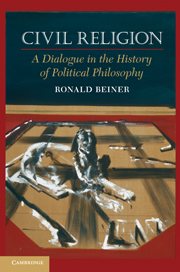Book contents
- Frontmatter
- Contents
- Preface and Acknowledgments
- Introduction
- Part I Machiavelli, Hobbes, Rousseau
- 1 Rousseau's Problem
- 2 The Machiavellian Solution
- 3 Moses and Mohammed as Founder–Princes or Legislators
- 4 Refounding and “Filiacide”
- 5 The Hobbesian Solution
- 6 Behemoth
- 7 Geneva Manuscript
- 8 Social Contract
- Part II Responses to (and Partial Incorporations of) Civil Religion within the Liberal Tradition
- Part III Theocratic Responses to Liberalism
- Part IV Postmodern “Theism”
- Conclusion
- Index
- References
1 - Rousseau's Problem
Published online by Cambridge University Press: 05 June 2012
- Frontmatter
- Contents
- Preface and Acknowledgments
- Introduction
- Part I Machiavelli, Hobbes, Rousseau
- 1 Rousseau's Problem
- 2 The Machiavellian Solution
- 3 Moses and Mohammed as Founder–Princes or Legislators
- 4 Refounding and “Filiacide”
- 5 The Hobbesian Solution
- 6 Behemoth
- 7 Geneva Manuscript
- 8 Social Contract
- Part II Responses to (and Partial Incorporations of) Civil Religion within the Liberal Tradition
- Part III Theocratic Responses to Liberalism
- Part IV Postmodern “Theism”
- Conclusion
- Index
- References
Summary
Bayle has proved very well that fanaticism is more pernicious than atheism, and this is incontestable. But what he did not take care to say, and which is no less true, is that fanaticism, although sanguinary and cruel, is nevertheless a grand and strong passion which elevates the heart of man, makes him despise death, and gives him a prodigious energy that need only be better directed to produce the most sublime virtues.
– Jean-Jacques RousseauThe term civil religion comes from a particular text – Book IV, chapter 8 of Rousseau's Social Contract. Nevertheless, pursued with sufficient doggedness, radicality, and intellectual ambition, the idea of civil religion can open up to us not only the unique political thought-world of Rousseau's work as a whole but also the unique thought-worlds of all major figures in the tradition of modern political philosophy. More to the point, it can open up to us the dimension of full dialogue between these thinkers, and not just their own thought-worlds seen as singular wholes. It is in this sense that this book aims at the presentation of a dialogue, or of a set of dialogues. From the point of view of this dialogue within the history of political philosophy, one can say that when Rousseau composes his civil-religion chapter, he is already familiar with two possible solutions to the problem of adjudicating the uneasy relation between politics and religion offered by his predecessors in the tradition of modern political philosophy (to be explored in Chapters 2–5 of Part I); in that sense, the civil-religion chapter already inserts itself into a dialogue in progress. However, Rousseau rejects both of these possible solutions as undesirable. In the Geneva Manuscript he explores a possible solution of his own, but he jettisons this as well when he comes to write the Social Contract. Hence, readers of Rousseau who believe the Social Contract should be interpreted as a determinate and realizable blueprint for an ideal political community need to think hard about the fact that the book concludes with the statement of a crucial political problem for which Rousseau is unable to propose any solution that he himself regards as acceptable.
The Social Contract concludes with a stunning paradox. The key statement of Book IV, chapter 8 is that “a State has never been founded without religion serving as its base” (“jamais État ne fut fondé que la religion ne lui servit de base”). This statement occurs in the context of a very penetrating analysis that lays out what one presumes to be an exhaustive survey of religious–political possibilities. There are two main alternatives: The first, to which Rousseau attaches the label “natural divine right,” is strictly otherworldly in its focus and finds its purest embodiment in the Christianity of the Gospels; the second, which Rousseau refers to as “civil or positive divine right,” embraces a variety of more worldly, theocratic regimes. These divide basically into two types: the fairly inclusive, local civil religion of Roman and other paganisms; and the more universalistic and therefore imperialistic theocracies of Islam and Judaism. All national religions will appear parochial relative to the universalism of Christianity, but as the contrast between Judaism/Islam and paganism shows, this parochialism can have either a (relatively) tolerant or aggressive cast. Rousseau also presents a third, hybrid, alternative – “mixed right” – which offers a kind of dual-sovereignty model, dividing authority between church and state. In practice, it means that the priests are tempted to usurp temporal authority for themselves, and to this extent undercut the established authority of the state. Rousseau calls it “the religion of the priest” and agrees with Hobbes in denying to this worldly–otherworldly religion any moral claim whatsoever. The most blatant target of this polemic is of course Catholicism, but as Rousseau concedes in the paragraph referring to Hobbes, this dividing of sovereignties is latent in the “spirit of Christianity” in general, not just the Catholic version of Christianity.
- Type
- Chapter
- Information
- Civil ReligionA Dialogue in the History of Political Philosophy, pp. 11 - 16Publisher: Cambridge University PressPrint publication year: 2010



